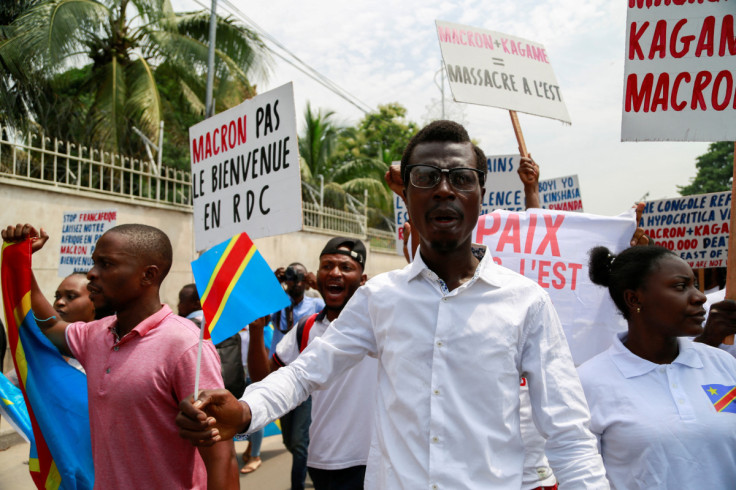Some Congolese Protest And Question Motives Of Macron Visit

Shouting through megaphones, a dozen Congolese anti-French protesters waylaid commuters on a busy road in the capital Kinshasa and passed out leaflets to boost opposition to a visit by French President Emmanuel Macron on Saturday.
Their campaign was part of a smattering of protests in Democratic Republic of Congo this week ahead of Macron's arrival for the final leg of a central Africa tour during which he has sought to distance himself from France's colonial past.
Congo is not a former French colony, but perceptions of French support for neighbouring Rwanda have stoked anti-French feeling as eastern regions battle an offensive by the M23 rebel group that Congo accuses Rwanda of backing. Rwanda denies this.
France has also denied favouring Kigali and has joined the United Nations, Congo and other countries in accusing Rwanda of supporting the M23. But it has faced criticism in Congo for not commenting sooner and more strongly.
Wearing a t-shirt with the slogan 'Rwanda Is Killing,' activist Tonny Djoli said France was turning its attention to Central Africa because of a breakdown in relations with former West African colonies.
"Macron is coming to Kinshasa to try and seduce us ... because he understands that the majority of West Africa has turned its back on France," he said.
Macron announced a new Africa strategy in a speech on Monday after a deepening security crisis in West Africa's Sahel region fuelled anti-French protests and brought juntas to power in Burkina Faso and Mali which have rejected long-standing military ties with Paris.
Under the new proposals, France plans to run military bases in partnership with host nations in Africa with fewer French troops on the ground.
EXPECTATIONS, FRUSTRATIONS
Macron has repeatedly sought to shake off the tag of former colonial power motivated by commercial gain. The schedule of his tour, which includes visits to Gabon, Angola, and Congo Republic, suggests a focus on the environment and culture.
But his visits to these four countries for the first time in his presidency comes amid a raft of African tours by high-level U.S., Russian, and Chinese officials that has fuelled speculation about world powers jostling for influence on the continent.
Around 100 Congolese protesters chanted outside the French embassy in Kinshasa on Wednesday. One had scrawled 'Macron, go away' on its wall in large red letters.
"Here in Congo we are victims of France. Macron is the French president who has had the most contact with Rwanda. Macron is not welcome," said Maud-Salome Ekila, a member of NGO Urgence Panafricaniste.
An adviser travelling with Macron said the protest was an effort to pressure France into taking sides. "We have a clear goal which is the territorial integrity of Democratic Republic of Congo and also the prevention of the risk of escalation."
A small group of protesters arrived at the embassy waving Russian flags, but the leaders of the larger anti-French protest said they were not affiliated with the group.
"We will never replace one imperialism with another," said Ekila.
On Thursday, protesters also tried to gather but were dispersed in Goma, the capital of Congo's eastern province that is worst-affected by the M23 insurgency that has displaced more than 600,000 people since last year.
"There are many expectations or frustrations (with France)," said Tr?sor Kibangula, a political analyst at the Ebuteli Institute, a Congolese research centre supported by New York University.
France's interests in Mozambique and Central African Republic, where Rwandan troops are helping governments fight insurgents, meant Macron had a tricky diplomatic hand to play, he said.
"On the one hand, he has to condemn what is happening with the M23 and the support of Kigali, and on the other hand, he does not want to condemn a partner that helps France," Kibangula told Reuters on Wednesday.
(Writing by Sonia Rolley; Additional reporting by Elizabeth Pineau in Luanda; Editing by Alessandra Prentice and Andrew Heavens)
© Copyright Thomson Reuters 2025. All rights reserved.





















